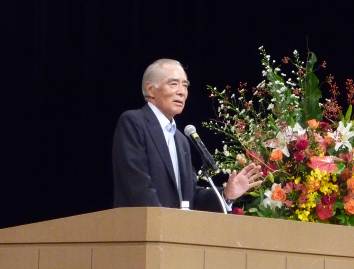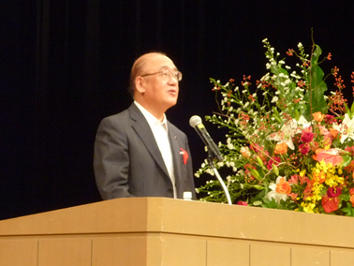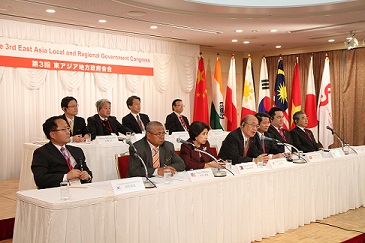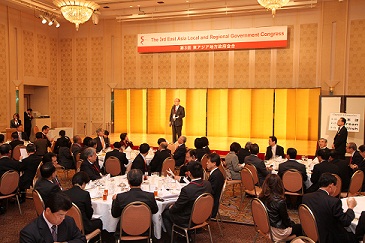<Theme-specific meetings>
(1) First theme-specific meetings
Date: August 28 (Tue.) – August 29 (Wed.), 2012
Place: Nara City, Nara Prefecture, Japan
Theme 1: “Social Security in terms of Aging Population and Decreasing Birth
Rate”
◆Moderator
Taro Miyamoto
(Professor, Hokkaido University School of Law)
Sang-Hoon Ahn
(Professor in the Department of Social Welfare, Seoul National University College of
Social Sciences, Korea)
◆Members (10 local and regional governments)
China: Jiangsu Province
South Korea: Jeollanam-do Province
Japan: Yamagata Prefecture, Tokushima Prefecture, Nara Prefecture,
Niigata City, Dazaifu City, Tenri City, Ikaruga Town, Shimoichi Town
Theme 2: “Methods for Efficient Collection of Local Tax and Developing Tax
Resources”
◆Keynote speech
Motohiro Sato
(Professor, School of International and Public Policy, Hitotsubashi University)
◆Moderator
Hakaru Hyakushima
(Commissioner of Nagoya Regional Taxation Bureau)
◆Members (9 local and regional governments)
Philippines: Aurora Province
Japan: Fukui Prefecture, Kyoto Prefecture, Kagawa Prefecture, Kumamoto Prefecture,
Nara Prefecture, Kashihara City, Gose City, Asuka Village
(2) Second theme-specific meetings
Date: September 10 (Mon.) – September 11 (Tue.), 2012
Place: Nara City, Nara Prefecture, Japan
Theme 3: “Regional Development”
(1) Community development through the use of historical and cultural properties
(2) Community development through tourism
(3) Transportation system and community development
◆Moderator
Hirofumi Hanaoka
(Deputy Director-General, City Bureau, Ministry of Land, Infrastructure, Transport and
Tourism)
Osamu Tanaka
(Executive Vice President of Policy Research Institute, Ministry of Finance)
◆Members (13 local and regional governments)
China: Xian City
Philippines: Baler City
Malaysia: State of Melaka
Japan: Niigata Prefecture, Toyama Prefecture, Ishikawa Prefecture, Fukui Prefecture,
Yamanashi Prefecture, Gifu Prefecture, Mie Prefecture, Wakayama Prefecture,
Shimane Prefecture, Nara Prefecture
Theme 4: “Human Resource Development”
(1)Development and training program for the local and regional government employees
(2)Developing human resources for community development
◆Moderator
Kiyotaka Yokomichi
(Professor and Advisor to the President of National Graduate Institute for Policy Studies)
Maki Shintaro
(Director of Regional Self-support Promotion Division, Local Administration Bureau,
Ministry of Internal Affairs and Communications)
◆Members (7 local and regional governments)
China: Linyi City,Dongying City
Japan: Shizuoka Prefecture, Tottori Prefecture, Kochi Prefecture, Nara Prefecture,
Nara City
<Symposium of the 3rd East Asia Local and Regional Government Congress and the ASPEN Institute Japan>
Date: October 17 (Wed.), 2012
Place: Nara City, Nara, Japan
Theme: “Developing human resources for the future – Growing presence of East Asia”
◆Keynote speech/Panelists
Yotaro Kobayashi
(Chairman of the ASPEN Institute, Japan, and former Chairman of the Board, Fuji Xerox Co.,Ltd.)
◆Moderator
Haruyoshi Shibuya
(Professor of the Faculty of Education, Saitama University)
◆Panelists
Katsuhiko Shirai
(Chairperson of the Foundation for the Open University of Japan, and Executive Advisor
for Academic Affairs of Waseda University (former President of Waseda University))
Shogo Arai
(Governor of Nara Prefecture)
Host: Nara Prefecture
Sponsor: The ASPEN Institute, Japan
Partner: Fuji Xerox Osaka Co., Ltd.
Supporter: Yomiuri Shimbun Osaka Head Office
Participants: Total of 180 people from business, education and other fields

Yotaro Kobayashi (Chairman of the ASPEN Institute, Japan)

Shogo Arai, (Governor of Nara Prefecture)

≪Plenary meeting≫
Date: November 5 (Mon.) – November 6 (Tue.), 2012
Participating local and regional governments: 38 governments from 5 countries
(Philippines, South Korea, Vietnam, Malaysia, Japan)
<38 governments>
Philippines(2): Aurora Province, Baler City
South Korea(6): Gyeonggi-do, Chungcheongnam-do, Gongju City, Seosan City,
Buyeo County, Jeollanam-do
Vietnam(3): Thua Thien-Hue Province, Phu Tho Province, Viet Tri City
Malaysia(1): State of Melaka
Japan(26): Fukushima Prefecture, Niigata Prefecture, Toyama Prefecture,
Fukui Prefecture, Yamanashi Prefecture, Nagano Prefecture, Gifu Prefecture,
Shizuoka Prefecture, Mie Prefecture, Kyoto Prefecture, Wakayama Prefecture,
Tottori Prefecture, Shimane Prefecture, Tokushima Prefecture,
Kagawa Prefecture, Nara Prefecture, Tagajo City, Niigata City, Dazaifu City,
Nara City, Tenri City, Kashihara City, Gose City, Ikaruga Town, Asuka Village,
Koryo Town
Place: Nara City, Nara Prefecture, Japan
○Main programs
(1)Members bilateral meetings (only by those requesting the meetings)
<Local governments that had bilateral meetings>
Chungcheongnam-do – Nara Prefecture
Gongju City – Kashihara City
Phu Tho Province – Mie Prefecture
Phu Tho Province, Viet Tri City – Nara Prefecture
Thua Thien-Hue Province – Toyama Prefecture
Thua Thien-Hue Province – Fukui Prefecture
Thua Thien-Hue Province – Yamanashi Prefecture
Thua Thien-Hue Province – Shizuoka Prefecture
Thua Thien-Hue Province – Kyoto Prefecture
Thua Thien-Hue Province – Wakayama Prefecture
Thua Thien-Hue Province – Tottori Prefecture
Thua Thien-Hue Province – Nara Prefecture
State of Melaka – Nara Prefecture
(2)Welcome party

(3)Group discussions
First session: Keynote speeches and reports
・Keynote speech “The Situation in East Asia and Responses by Local and Regional Governments”
Nobuo Ishihara
(President of the Research Institute for Local Government)
・Reports on outlines of theme-specific meetings
・Theme 1: “Social security in terms of aging population and decreasing birth rate”
Shogo Arai
(Governor of Nara Prefecture)
・Theme 2: “Methods for efficient collection of local tax and developing tax resources”
Hakaru Hyakushima
(Commissioner of Nagoya Regional Taxation Bureau)
・Theme 3: “Regional development”
Hirofumi Hanaoka
(Deputy Director-General, City Bureau, Ministry of Land, Infrastructure, Transport and
Tourism)
・Theme 4: “Human resource development”
Shinobu Shiikawa
(Advisor to the Ministry of Internal Affairs and Communications on regional vitalization
and “green decentralization reforms” (former Director-General of the Local Public
Finance Bureau, former (first) Director-General for Regional Vitalization))
Second session: Group discussions
Theme 1: Social security in terms of aging population and decreasing birth rate
◆Moderator
Shogo Arai
(Governor of Nara Prefecture)
◆Members (7 local and regional governments)
South Korea: Seosan City
Japan: Tokushima Prefecture, Nara Prefecture, Niigata City, Dazaifu City, Tenri City,
Ikaruga Town
Theme 2: “Methods for Efficient Collection of Local Tax and Developing Tax
◆Moderator
Hakaru Hyakushima
(Commissioner of the Nagoya Regional Taxation Bureau)
◆Members (9 local and regional governments)
South Korea: Buyeo County
Philippines: Aurora Province
Vietnam: Phu Tho Province, Viet Tri City
Japan: Kyoto Prefecture, Kagawa Prefecture, Nara Prefecture, Gose City, Asuka Village
Theme 3: “Regional Development”
◆Moderator
Hirofumi Hanaoka
(Deputy Director-General, City Bureau, Ministry of Land, Infrastructure, Transport and
Tourism)
Osamu Tanaka
(Executive Vice President of Policy Research Institute, Ministry of Finance)
◆Members (14 local and regional governments)
South Korea: Chungcheongnam-do, Jeollanam-do
Philippines: Baler City
Malaysia: State of Melaka
Japan: Fukushima Prefecture, Toyama Prefecture, Fukui Prefecture,
Yamanashi Prefecture, Gifu Prefecture, Mie Prefecture, Wakayama Prefecture,
Shimane Prefecture, Nara Prefecture, Tagajo City
Theme 4: “Human Resource Development”
◆Moderator
Shinobu Shiikawa
(Advisor to the Ministry of Internal Affairs and Communications on regional vitalization
and “green decentralization reforms” (former Director-General of the Local Public
Finance Bureau, former (first) Director-General for Regional Vitalization))
◆Members (8 local and regional governments)
South Korea: Gyeonggi-do, Gongju City
Vietnam: Thua Thien-Hue Province
Japan: Shizuoka Prefecture, Tottori Prefecture, Nara Prefecture, Nara City, Koryo Town
(4)Plenary meeting and Commemorative photo session
◆Introduction and Approval of New Member Governments
◆Project Report
◆Procedure for the amendment of Nara Charter

(5)Representatives’ press conference
◆Chairman’s report

(6)Governor’s banquet (formal dinner)

Report by the Chairperson
At the 3rd East Asia Local and Regional Government Congress held in 2012, we further developed the theme-specific group discussions that were well-received at the previous year’s congress and held group discussions on four themes selected by the secretariat Nara Prefecture, based on questionnaires answered by member local and regional governments. The four themes were “Social security in terms of aging population and decreasing birth rate,” “Methods for efficient collection of local tax and developing tax resources,” “Regional development,” and “Human resource development,” and all were tasks shared by the local and regional governments.
We had the member local and regional governments choose in advance the discussion themes they would participate in, and then conduct discussions mainly about best practices for government tasks.
First we held discussions on two themes each on August 29 and September 11, 2012 as a congress for working-level staff members. Lecturers made evaluations and participants exchanged opinions with each other, based on keynote speeches by the lecturers and reports on efforts by member local and regional governments. The discussions were extremely lively, the government tasks faced by each of the local and regional governments were narrowed down to their focus points, and the best practices for those focus points were extracted.
At the plenary congress held on that day, Mr. Nobuo Ishihara, Director of the Research Institute for Local Government and former Deputy Chief Cabinet Secretary, first gave a keynote speech titled “The situation in East Asia and responses by local and regional governments.” Mr. Ishihara pointed out the important fact that, with awareness that takes into consideration the situations in East Asian societies, such as declining and aging populations and a reduced rate of economic growth, bringing up and discussing knowledge and ideas about the four themes taken up at the congress will not only contribute to resolution of government tasks faced by the local and regional governments of East Asia, but will also help contribute to alleviation of the sometimes strained relations at the central government level by deepening mutual understanding and exchanges through such undertakings.
After that, the moderators for each theme reported the results of discussions at the congress for working-level members. In the afternoon, there were lively discussions by people of the head of government class, based on the morning’s keynote speeches and discussions at the congress for working-level members, and even deeper discussions were conducted about best practices for various government tasks.
The following is a report that summarizes the results (overviews) of the discussions for each theme, according to the two points below.
I. Specific measures by local and regional governments (best practice)
II. Specific measures for further improvements from now on (in terms of operations and systems)
The methods for summarizing the discussions for each theme are somewhat different. This is because the points under discussion were organized according to the actual discussions and in a way to make them easy to refer to for practical use, since the nature of each of the themes and the nature of the discussions were different. Some themes were thought to be of reference and easy to understand if examples were given, and some themes were thought to highlight common resolution measures if examples were summarized and arranged to some degree.
Please note that this report by the chairperson is merely a summary made by the Governor of Nara Prefecture, who serves as the chairperson, and Nara Prefecture, which serves as the secretariat. We received precise recommendations and guidance from the various lecturers and moderators for the theme-specific group discussions. Thank you very much for your kind cooperation and support.